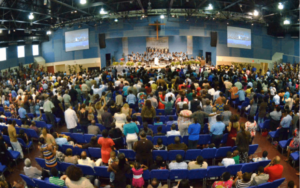“My faith was and is my most valuable resource,” Jameisha Brown says. “I learned to maintain hope, even when I was told there was none left.”
Even though Hurricane Harvey made landfall in August 2017, the devastation left in its wake continues to affect many Texans and their communities.
Here to explore what it means for a community to tackle sustained trauma together is Jameisha Brown, director of the health ministry at Windsor Village United Methodist Church and a PhD student at Texas A&M. She breaks down the relationship of faith and resilience in community building and rebuilding.
Her timely insights are followed up by an update from Hogg Foundation program officer Vicky Coffee regarding a grant initiative that is now supporting post-Harvey community interventions.
Unity Aids Recovery
According to Brown, resilience is a “characteristic that allows someone to get back up following an experience of adversity.” When disasters like Harvey challenge the endurance of entire communities, building resilience becomes more than a matter of acquiring sufficient financial and institutional support.
“The important factor of community resilience is unity—the coming together in support of a fellow neighbor,” Brown says. “Social support is vital in how we all move forward.”
In the case of Brown’s church community, congregants mobilized to help one another “enthusiastically,” with hundreds volunteering to aid reconstruction efforts and donating much-needed material goods.
“The church community offers African Americans a safe haven,” Brown says. “Historically, when we were not allowed to go into other areas, it also offered a gathering place for matters of social justice and community organizing.”
In order to create that safe haven, key sources of nourishment—material and spiritual—must be replenished consistently. “Some of the work that we do as a health and wellness initiative is to help others build and rebuild better lives,” Brown says. “We do that by helping them achieve wholeness in mind, body and spirit through our faith-based health and research programs.”
The Power of Hope
Windsor Village has established more than 40 formal partnerships with organizations whose issue areas range far and wide across the mental health spectrum, including HIV prevention and criminal justice reform.
Their integrative approach to community engagement gives congregants access to resources well beyond their place of worship—creating a resilient network of services around an equally strong core of hope and faith.
Achieving that degree of kinship is an important goal of the Hogg Foundation’s faith-based grant initiative. “We really want different grantees to develop a stronger collaborative,” Vicky Coffee says in the episode’s second segment. “So once the grant has ended, they’re able to continue these efforts in their communities.”
The importance of collaboration in crisis recovery efforts cannot be overstated. It can also kindle what Brown calls “post-traumatic success.”
“Post-traumatic success is how we use difficult circumstances in life to our benefit,” Brown says.
A prevalent example of this can be found in community-sponsored initiatives to restore areas damaged by Harvey. As much as images of wreckage saturated headlines, so, too, did inspiring stories of compassion, courage and cooperation.
After the storm, Brown saw the same sense of solidarity seize her community. “Though we had very few goods of value, we had hope,” she says. “The kind of hope that’s necessary to get through extreme difficulty.”
Learn more about our podcast and check out other episodes!

